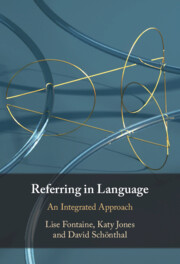Book contents
- Referring in Language
- Referring in Language
- Copyright page
- Contents
- Figures
- Tables
- Acknowledgements
- Part I The Nature of Referring and Referring Expressions
- Part II Typical Reference
- Part III Atypical Reference
- 7 Referring in Non-collaborative Contexts
- 8 Indefinite Expressions for Referring Definitely
- 9 Child’s Play
- 10 Reference and Metonymy
- 11 Epilogue
- References
- Index
7 - Referring in Non-collaborative Contexts
from Part III - Atypical Reference
Published online by Cambridge University Press: 22 June 2023
- Referring in Language
- Referring in Language
- Copyright page
- Contents
- Figures
- Tables
- Acknowledgements
- Part I The Nature of Referring and Referring Expressions
- Part II Typical Reference
- Part III Atypical Reference
- 7 Referring in Non-collaborative Contexts
- 8 Indefinite Expressions for Referring Definitely
- 9 Child’s Play
- 10 Reference and Metonymy
- 11 Epilogue
- References
- Index
Summary
This chapter examines reference in a non-collaborative context. Despite the collaborative nature of referring, there are times when referring become problematic. Focussing specifically on problems in referring, we explore some of the reasons for problematic reference, including how the problems get resolved. The main focus of the chapter is on uses of reference in contexts which are discursively non-collaborative, despite shared common ground. This chapter makes a significant contribution by detailing how referring works when the speaker and addressee do not share goals and have no invested interest in a shared conceptualisation of the referent. We look at various examples from primarily legal contexts to extend our understanding of reference in these contexts. We show that collaboration is indeed needed even when the social relationship is adversarial but that the strategies for ratifying an expression differ depending on whether or not speaker and addressee share the same discourse goals.
- Type
- Chapter
- Information
- Referring in LanguageAn Integrated Approach, pp. 127 - 149Publisher: Cambridge University PressPrint publication year: 2023

